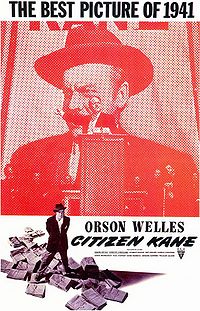Citizen Kane
 From Conservapedia
From Conservapedia | Citizen Kane | |
|---|---|

| |
| Directed by | Orson Welles |
| Produced by | George Schaefer Orson Welles |
| Written by | Orson Welles Herman J. Mankiewicz |
| Starring | Orson Welles Joseph Cotten Dorothy Comingore |
| Music by | Bernard Herrmann |
| Cinematography | Gregg Toland |
| Editing by | Robert Wise |
| Distributed by | RKO Radio Pictures |
| Release date(s) | May 1, 1941 |
| Running time | 119 min |
| Country | USA |
| Language | English |
| Budget | $686,034 |
Citizen Kane is a 1941 American drama film produced and directed by Orson Welles, who also played the title character.[1] Many critics have named it as the greatest movie of all time. It was also voted #1 on the American Film Institute's list of the hundred best American movies ever made.[2] Though it was nominated for nine Academy Awards, it only won one for Best Original Screenplay (Orson Welles and Herman J. Mankiewicz), and was beaten in the Oscar race for best picture by How Green Was My Valley in one of the Worst Liberal Snubs.
Orson Welles was only 25 years old when he made this masterpiece as its director, co-author, producer, and lead role.[3] It was his first feature film.
Plot[edit]
Charles Foster Kane, multi-millionaire newspaper baron, has not been dead for long as reporters begin to investigate his rags-to-riches life in a search for the meaning of his last word: "Rosebud".
Kane was born to an impoverished boardinghouse keeper during the 1870s. After a defaulting boarder left them a deed to a successful gold mine, Mrs. Kane sent her son to live with Wall Street tycoon Lawrence Thatcher in New York City. Mrs. Kane did so to get her son away from his abusive father, but there would be a devastating price to pay.
Upon reaching adulthood, Kane informs his former guardian that he is not interested in any of his investments except for The New York Enquirer, a newspaper which has been taken as collateral for a bad loan. By running the Enquirer as a sensationalistic scandal sheet, Kane succeeds in building it into the City's most successful newspaper. In the process, he attacks Thatcher's business interests, forces the United States into the Spanish-American War, and increasingly alienates his best friend, Jedediah Leland.
Despite the success of his media empire, Kane remains unsatisfied. He marries the President's niece and sets his sights on political office. Although Mrs. Kane originally marries him for love, she soon realizes that her husband does not really care for her. Instead of leaving him, however, she continues to keep up appearances for the sake of their son. As for Kane, he begins a discreet affair with a young woman named Susan Alexander.
Meanwhile, Kane runs for Governor of New York and vows both in his campaign speeches and in the Enquirer to crush political boss Jim Gettys. On the eve of the 1916 election, however, Jim Getty's lures the Kanes to Susan Alexander's apartment and serves them an ultimatum: either Kane drops out of the election or his affair with Susan will be leaked to the press. Although Mrs. Kane pleads with him to protect their family from the scandal, her husband refuses to listen. He insists that he will win the election anyway and send Gettys to Sing-Sing Prison. Disgusted, Mrs. Kane divorces her husband, who marries Susan Alexander immediately. Due to the scandal, Kane is slaughtered at the voting booths.
In the aftermath, Jedediah arrives at the Enquirer offices drunk. With great insight, he deconstructs Kane and accuses him of wanting the public's love as a gift for services rendered. He declares that, with the rise of labor unions, the "poor and underprivileged" don't need Kane anymore. To Kane's shock, Leland climaxes by asking to be transferred to the new Chicago newspaper.
Later, Kane pays for singing lessons for Susan and builds her a massive opera house in Chicago. Although no one else actually likes Susan Kane's voice, Kane insists that she continue performing. Only when she attempts suicide does he finally relent.
In later years, he builds Xanadu, a massive estate in Florida filled with statues, pleasure grounds, and "the largest zoo since Noah." Despite Susan's hatred of Xanadu, he insists that it is their home and refuses to take her back to New York.
At last, Susan Kane reaches the end of her tether. She packs her bags and prepares to leave her husband. Devastated by the thought of losing her, Kane pleads with her to stay and tells her, "You can't do this to me." Viewing this as proof that her husband loves no one but himself, Susan storms out of the estate in a rage.
Soon after, Kane dies, wealthy, powerful, and completely alone in a hell of his own making. Meanwhile, the reporters finally give up all hope of uncovering the meaning of his last words. Then, however, a sled with the title "Rosebud" is cast into the furnace. It is a relic from Kane's childhood at his mother's boarding house, the only time when he was both penniless and completely happy.
Media Backlash[edit]
Kane was modeled after Progressive media mogul William Randolph Hearst, who was enraged by the negative portrayal of his mistress, Marion Davies. As a result, he used his influence in order to force RKO Pictures not to release the film in theaters. The career of Orson Welles never recovered from Hearst's campaign.
References[edit]
Categories: [Movies] [Historical Dramas]
↧ Download as ZWI file | Last modified: 02/25/2023 14:07:29 | 9 views
☰ Source: https://www.conservapedia.com/Citizen_Kane | License: CC BY-SA 3.0
 ZWI signed:
ZWI signed: KSF
KSF